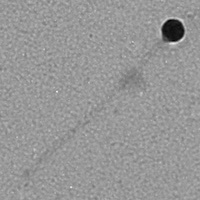Gordonia phage Granola
Know something about this phage that we don't? Modify its data.
| Detailed Information for Phage Granola | |
| Discovery Information | |
| Isolation Host | Gordonia terrae 3612 |
| Found By | Meera Garg |
| Year Found | 2018 |
| Location Found | Pittsburgh, PA USA |
| Finding Institution | University of Pittsburgh |
| Program | Science Education Alliance-Phage Hunters Advancing Genomics and Evolutionary Science |
| From enriched soil sample? | No |
| Isolation Temperature | Not entered |
| GPS Coordinates | 40.44628 N, 79.95314 W Map |
| Discovery Notes | The soil was collected on an overcast morning, and the temperature was around 77 degrees F. The soil was mostly dry, and it was adjacent to bushes and underneath mulch. The soil was transported for 2 minutes at outside temperature and it remained in a backpack for approximately 1 hour before direct isolation. |
| Naming Notes | On the direct isolation and spot test plates, the plaques from the phage gave a speckled appearance, which reminded the finder of granola and its various components. Also, granola is very near and dear to the finder's heart. |
| Sequencing Information | |
| Sequencing Complete? | No |
| Genome length (bp) | Unknown |
| Character of genome ends | Unknown |
| Fasta file available? | No |
| Characterization | |
| Cluster | Unclustered |
| Subcluster | -- |
| Annotating Institution | Unknown or unassigned |
| Annotation Status | Not sequenced |
| Plaque Notes | For plaque purification, Granola was grown and incubated for 3 days with 1x top agar on a PYCa plate and Gordonia terrae. The plaques are completely clear with well-defined edges. Plaque sizes are small and round, ranging between 1-2mm in diameter. Considering that lytic phages generally produce clear plaques, and temperate phages usually have cloudy plaques, Granola is currently hypothesized to be a lytic phage. |
| Has been Phamerated? | No |
| Publication Info | |
| Uploaded to GenBank? | No |
| GenBank Accession | None yet |
| Refseq Number | None yet |
| Archiving Info | |
| Archiving status | Archived |
| Pitt Freezer Box# | 90 |
| Pitt Freezer Box Grid# | C1 |
| Available Files | |
| Plaque Picture | Download |
| EM Picture | Download |

